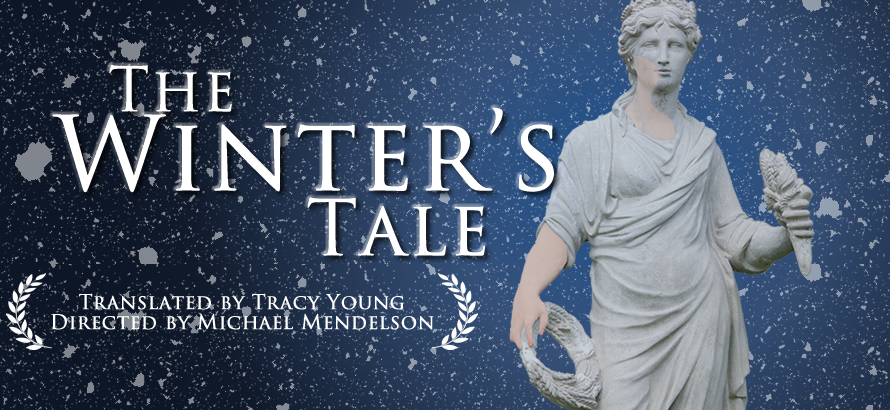The Winter’s Tale Synopsis
THE WINTER’S TALE SYNOPSIS
 ACT I
ACT I
Polixenes is the King of Bohemia. His wife, Queen Hermione, is pregnant, and she has a young son, Mamillius. Leontes is the King of Sicilia. Polixenes and Leontes have been lifelong friends. Polixenes has been visiting Leontes for nine months, but now Polixenes is eager to return to Bohemia.
Leontes begs Polixenes to delay his departure, but Polixenes refuses. When Hermione is able to persuade Polixenes to stay, Leontes becomes suspicious that his wife has been unfaithful with his friend. As his obsession grows, Leontes asks his servant, Camillo, to poison Polixenes. Camillo warns Polixenes, and Camillo and Polixenes they flee the country, leaving Hermione and Mamillius to face Leontes’s wrath.
ACT II
Leontes sends Hermione to prison where she gives birth to a baby girl. Leontes orders two messengers to inquire at the oracle at Delphi to prove his suspicions correct. Hermione’s friend, Paulina, takes the baby to try and persuade Leontes to free his wife and overcome his obsessions. Instead, it only infuriates him further. He threatens the baby, Paulina, and Paulina’s husband, Antinogus. Leontes orders Antigonus to take the baby into exile.
ACT III
Weak from her childbearing, Hermione is brought to trial where her innocence is proven by a message from the oracle. News comes that Mamillius had died from distress at his mother’s arrest. Hermione collapses and is taken away. Paulina soon returns with news that Hermione has died. Leontes faces reality and remorse for his actions.
Antigonus dreams that Hermione has told him to name the baby Perdita and to leave the baby on a beach in Bohemia. A bear appears and Antigonus distracts the bear from attacking Perdita. The bear chases Antigonus. A shepherd and his son find Perdita and take her home.
ACT IV
At the beginning of Act 4, Time, personified as a character, explains that sixteen years have passed since the exile of Perdita. He mentions that Leontes mourns the loss of his wife and children.
In Bohemia, Camillo asks Polixenes if he can return home. Polixenes denies his request. He mentions how his son, Prince Florizel, has met and fallen in love with a shepherd’s daughter named Perdita. This relationship is far below the social station of the Prince, and Polixenes is not happy. Polixenes and Camillo, in disguise, attend a sheep-shearing feast where Perdita is dressed up as queen of the feast. When Florizel proposes to Perdita, Polixenes reveals himself. He denounces Florizel and threatens Florizel, Perdita, and the shepherd.
ACT V
Camillo, still anxious to see his homeland, helps Florizel and Perdita escape and travel to Sicilia. They are followed by the shepherds, who in turn are pursued by Polixenes and Camillo. At Leontes’s court, Florizel introduces himself and Perdita as ambassadors on behalf of his father. Leontes, still in mourning over his actions, welcomes Florizel and his new wife. Polixenes and Camillo arrive.
Leontes learns that Perdita is the daughter he banished. With Perdita now a suitable wife for Florizel, everyone is reunited, and Leontes and Polixenes mend their past. As the play concludes, Paulina reveals a newly completed statue of Hermione. Everyone, especially Leontes, remarks at how beautiful and realistic the statue looks.
Upon Paulina’s direction, music sounds, and the statue comes to life.
Florizel and Perdita are married, Leontes and his Queen are restored to one another and, as a reward for her care, Paulina is given Camillo to be her new husband.
Some Additional Notes:
In Act III, when Antigonus comes ashore to leave Perdita on the beach in Bohemia, a bear emerges from the forest, growling, and moves toward the baby. Antigonus distracts the bear and says, “Come and get me.” The stage direction that follows, which is one frequently cited in theatre, reads: “Exit, pursued by a bear.” His unfortunate fate is revealed near the end of the play.
In Act IV, there is a change in pace and tone from the tragic story that is told in the first three acts. Sixteen years have passed, the setting is the countryside in Bohemia where the shepherds live and Perdita has been raised, and a new character, Autolycus, a pickpocket, is introduced. Autolycus changes the tone of the play from a tragedy to a pastoral comedy. He sings and interacts with the shepherd’s son, whose name is Clown. He attends the sheep-shearing festival. He moves the plot forward when he agrees to exchange his clothes with Florizel so Florizel can sneak onto the ship to Sicilia unnoticed, and he redirects the shepherd and Clown, onto the ship so that they can explain what happened to Perdita during the first sixteen years of her life. In the end, Autolycus becomes an honest man, and Leontes begs for and receives forgiveness from Hermione and Plixenes.
Keep your eye on Paulina. She forces her way into Leontes’s presence with his newborn child and confronts him. After Hermione’s death, she is a constant reminder of what he did, and she keeps him from forgetting and marrying again. She orchestrates Hermione’s resurrection. She is an orchestrator of events and worth watching.
